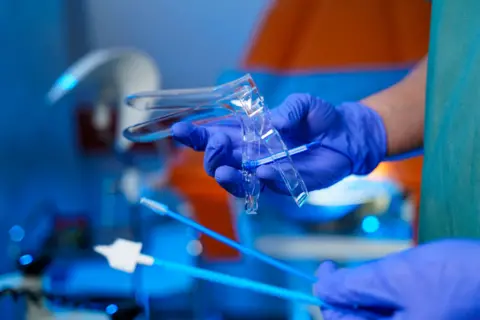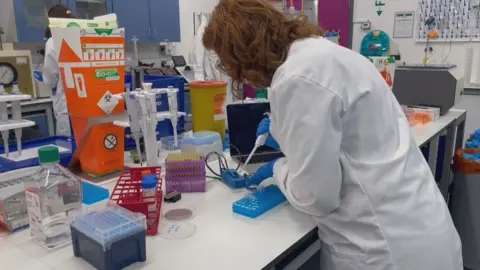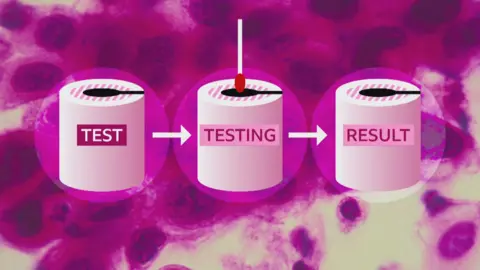
‘I’ve invented an alternative to uncomfortable smear tests’
- Health
- June 28, 2024
- No Comment
- 146
By Joanne MacAulay, BBC Scotland News
 Venture Builder Incubator
Venture Builder Incubator When Sânziana Foia went for her first smear test at the age of 25, she was surprised by how uncomfortable she found the whole experience.
The post-graduate student thought there must be different and better ways of testing women for the signs of cervical cancer.
Sânziana said: “I had my first smear test about three years ago and it was a hugely unpleasant experience. Talking to other women I realised it’s actually quite a shared unpleasant experience.
“Since I was already doing a PHD in bio-engineering and I was developing bio-sensors, I thought maybe there is a way to do this that’s non-invasive and that women can have control over themselves.
“This hasn’t been innovated in decades so it seemed like a good place to start.”
She got to work and the result is a new system called Papcup, a small device which enables women to test themselves at home using a sample of menstrual blood.
The device looks for signs of the cancer-causing HPV strains, in the same way a traditional smear would. But there is no need for a doctor’s appointment or to wait for results.
 Getty
GettySânziana told BBC Scotland News: “It’s a small device, about the size of my fist. You add to it a sample of menstrual blood that you collect with a swab.
“In the device is a bio-sensor which is the detection unit. That reads how much HPV there is in the sample and comes up with a read-out in about 15 minutes.
“This device aims to provide a virtually instant test because everything else takes days or weeks to come back as a result. “
The Papcup has passed the feasibility stage and a prototype is now being developed. Once that is ready there will be further refinement and clinical trials.
Sânziana said: “We have developed the mechanical designs, the electronics and we have the proof of concept for the bio-censors.
“Now it’s a matter of bringing it all together and being able to demonstrate this on the table, raising investment so we can refine the bio-sensor, and down the line clinical trials so we can finally bring this to women as a product.”
Sânziana – who is originally from Romania – is doing her PHD at Imperial College London, where her idea was initially developed through its Advanced Hackspace mentoring system.
 Imperial College London
Imperial College LondonBut she now receives support from a programme at the University of Edinburgh called the Venture Builder Incubator, which aims to help innovations progress from idea to reality.
Andrew Parfery is the programme manager for VBI.
“The gap that we’re here to plug is to help researchers, PHD students and academic staff take their idea and innovation and turn it into a business and launch it into the market to have real impact,” he said.
“We’re here for people across the universities of the UK, in particular those that have a health and social care innovation, so we’re open now for applications in particular for those that have technology-driven solutions.”
The most recent NHS data shows that around a third of women in the UK don’t attend their smear test appointments.
The take-up rate is lower in certain areas, meaning many are missing their chance for cancer-causing HPV strains to be spotted. An early diagnosis can potentially save lives according to Cancer Research Horizons, which is the commercial arm of the charity.
‘Save many lives’
Cidgem Selli is from CRH, which has been involved in Sânziana’s project.
She said: “We know one in two people will be diagnosed with cancer at some point in their lives.
“If we can detect cancer earlier using novel health technologies and inventions that are brought from the laboratories to the bedside, then we will save many lives.”
The uptake of smear tests amongst younger women is also lower but Sânziana hopes her device will change this.
“Once they turn 25 and they’ve had their first smear tests, a lot of them are delaying their next appointments, postponing or skipping altogether, or they live with anxiety for months leading up to it.
“But they can use the new test in their own private safe spaces – they don’t need to interact with a complete stranger in such a vulnerable position. It gives them back the power to test on their terms.”

Post-menopausal women and those who don’t menstruate can still use the test.
She said: “They can still test with a Papcup using a traditional swab. It still poses some advantages as you collect the swab yourself and the result is still instant, so you don’t have to send it off to a lab and wait anxiously for weeks for your results to come back.”
The routine smear test looks for cancer-causing HPV strains, and if they are found then there are further investigations.
The Papcup also looks for harmful HPV strains.
Sânziana said: “If someone gets a positive HPV test then they might want to go and get the full smear test for full diagnosis, where they look in depth at what’s going on. But we aim to break through that first barrier that women have towards getting their smear test.
“It’s very much about addressing this gap in healthcare and inequalities which lead to women skipping their appointments. We hope to be able to offer women a much more comfortable screening experience.”
#Ive #invented #alternative #uncomfortable #smear #tests









